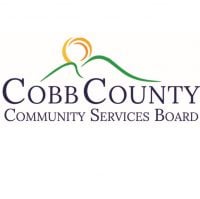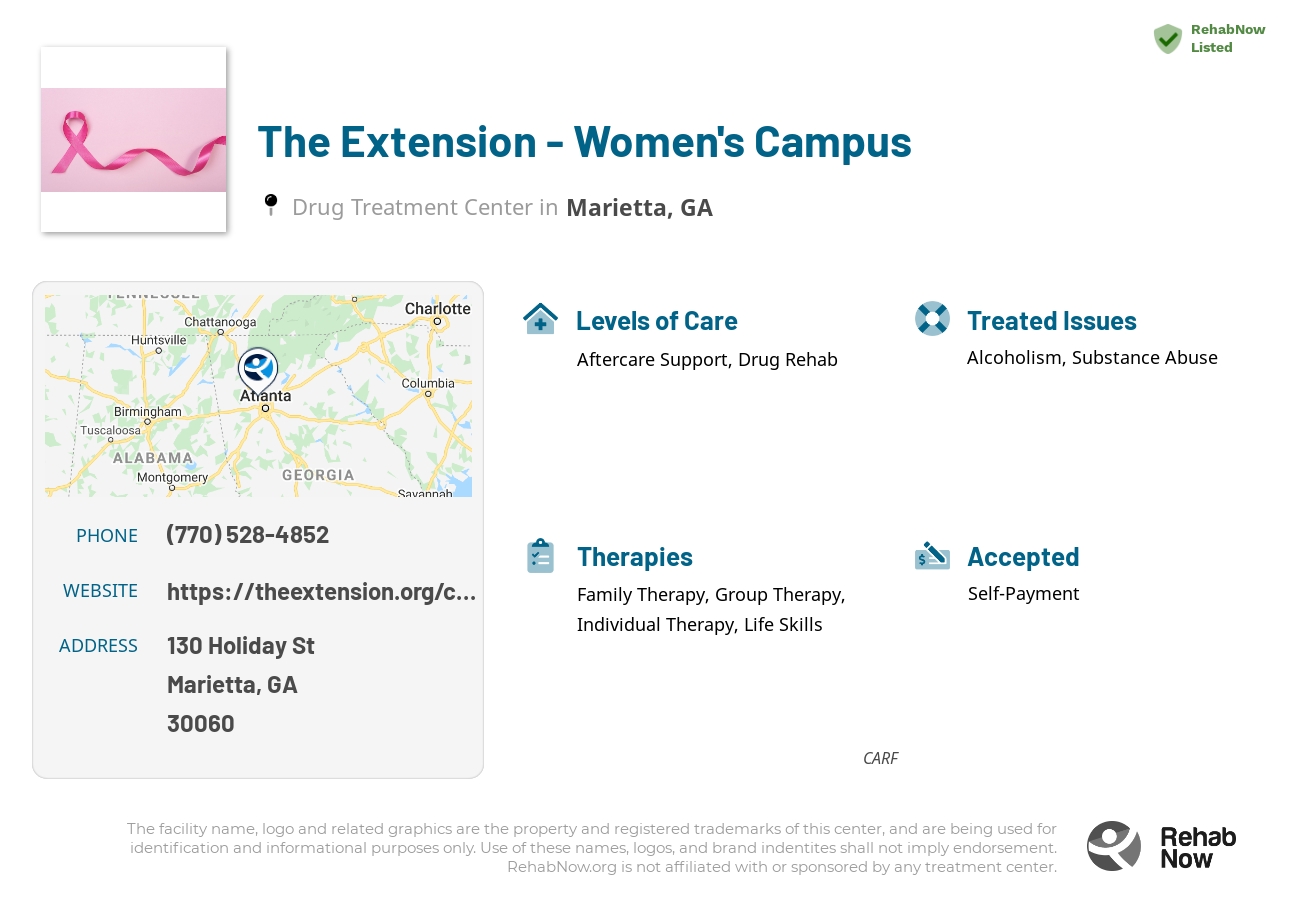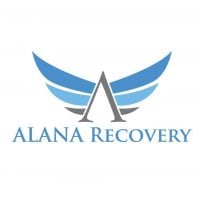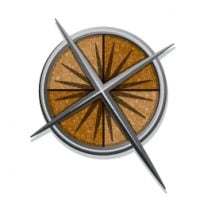
The Extension - Women's Campus
Drug Rehab Center in Marietta, Georgia
- Substance Abuse
- Mental Health
- Drug Addiction
- Alcoholism
The Extension - Women's Campus is a CARF-accredited addiction treatment center located in Marietta, GA which offers comprehensive outpatient and residential treatment services along with evidence-based treatments, family therapy, group therapy, individual therapy, life skills, and on-site drug testing in a supportive, safe environment.
Multiple patients have reported The Extension - Women's Campus as permanently closed.
Research other rehabs in Marietta, Georgia, or get help finding an open facility.
Our experts will find you an alternative facility.
(888) 674-0062 24/7 Free, Confidential, Expert HotlineAbout This Georgia Facility
Located in Marietta, GA, The Extension is a unique alcohol and substance use rehab center focusing on helping homeless men and women regain control of their lives. With a men’s campus that can host up to 57 and a women’s campus with 25 beds, this facility offers a nine to twelve-month inpatient residential program deeply rooted in the Matrix Model.
Accredited by CARF, The Extension - Women's Campus ensures high-quality and effective treatment programs for women struggling with addictions and possible mental health issues. This facility not only provides aftercare support but also personalizes care to address individual needs, thereby fostering long-term recovery.
- Tailored to each woman’s recovery journey, the program integrates practical life skills education such as money management and effective communication.
- Residents participate in a structured, three-phase program focusing on addiction education, personal development, and relapse prevention.
- A comprehensive aftercare plan is developed for each patient, emphasizing a realistic understanding of relapse warning signs and management techniques.
Addressing addictions to alcohol and drugs, The Extension - Women's Campus in Marietta, GA, offers treatment methods including counseling and education on relapse prevention. The care levels span from inpatient residential to aftercare support, aiming to equip women with the necessary skills for a productive and healthy life.
Genders
Ages
Modality
Additional
Accreditations

CARF
The Commission on Accreditation of Rehabilitation Facilities (CARF) is a non-profit organization that specifically accredits rehab organizations. Founded in 1966, CARF's, mission is to help service providers like rehab facilities maintain high standards of care.
Conditions and Issues Treated
People who abuse drugs are likely to suffer from an addiction, which can cause serious health problems. When it comes to helping drug abusers get sober, there are many options to choose from. It is essential to state that there is no “”correct”” way of doing things. People are different, and they need different types of help to get over their addiction.
Levels of Care Offered at The Extension - Women's Campus
This center offers a variety of custom treatment tailored to individual recovery. Currently available are Aftercare Support, Drug Rehab, with additional therapies available as listed below.
People who have completed a rehab program often need continued support from the addiction treatment team in order to remain abstinent from drugs and alcohol. Aftercare can be beneficial for personal, social, and emotional growth.
Common aftercare options include:
- Individual Therapy – this type of addiction counseling is available on a one-on-one basis. This can be beneficial for people with a high degree of emotional turmoil and a strong desire to overcome addiction.
- Group Therapy – this type of addiction counseling is available in a group setting. This type of treatment can be beneficial for people who are unable to attend regular therapy appointments due to other responsibilities.
- Family Therapy – this type of addiction counseling is available to the family members of addicts. This can be beneficial for people who are unable to fully comprehend what their loved ones are experiencing due to addiction.
Therapies & Programs
Therapy sessions focused on the individual addict can provide much-needed guidance as they work toward overcoming their addiction. These types of sessions typically involve guidance from a therapist, who will help addicts identify and process their feelings and cravings.
During these sessions, addicts may develop plans for coping with the triggers that typically lead to relapse and learn how to avoid those triggers during their recovery process.
The main goal of family therapy for drug addiction is to create an environment where communication can occur without judgment, hostility, or blame that often occurs within a family.
Family therapy is a type of group problem-solving that aims to improve communication and relationships between the patient, their family, and sometimes friends. The therapist is with the family as they learn to communicate with each other differently, especially with the addict when s/he is using.
The family can learn to reduce their enabling behavior or rally together and support each other during tough times. The patient also learns how to deal with their addiction and maintain sobriety while interacting with the family.
Different types of addiction treatment services are available. Within this article, group therapy is of interest due to its high success rate compared to individual therapy. Group therapy settings are beneficial because they allow recovering addicts to build a strong support network.
Benefits of group therapy are:
- Reduces feelings of isolation
- Immediate access to social support in the form of fellow addicts in recovery
- Lowers risk of relapse
- Increases rate of sobriety
- Builds coping skills that can be applied to everyday life
Those struggling with addiction in Georgia can benefit from learning certain life skills. It is not as simple as quitting drinking or taking drugs and thinking that the hard part is over. Being sober means living a whole new way of life. Many recovering addicts have found that they need to develop talents like time management, organization, communication skills, socialization skills, and self-esteem to make their life in sobriety work.
Drug and alcohol addiction can lead to a breakdown in life skills. Learning certain life skills can help those who are struggling with addiction. Life skills training at The Extension - Women's Campus in Marietta, GA teaches patients skills such as time management, budgeting, and social abilities to improve their quality of life and prevent relapse.
An addict’s life skills are maladaptive, meaning they are counterproductive. An addict may have learned poor time management skills growing up, have a hard time budgeting money, or be socially awkward. An addict’s poor life skills can lead to relapse and the inability to achieve long-term sobriety. Life skills training teaches patients effective coping mechanisms, which can help them live a clean and sober life.
Payment Options Accepted
For specific insurance or payment methods please contact us.
Additional Details
Specifics, location, and helpful extra information.
Marietta, Georgia 30060 Phone Number(770) 528-4852 Meta DetailsUpdated April 15, 2024
Staff Verified
Patient Reviews
There are no reviews yet. Be the first one to write one.
Marietta, Georgia Addiction Information
Prescription opioid use has caused a large increase in the total amount of overdoses in Georgia. Almost 12% of the Georgia population uses illicit drugs each year, and slightly over 3.5% also abuses alcohol at the same time. This does not include those who binge-drink at least once a month, which includes 20% of all Georgians.
The drug addiction problem in Marietta, GA, is relatively inadequate. Approximately 9% of Marietta abuse drugs. 4,000 deaths per year are attributed to drug overdoses. Overdose rates for opioids increased by more than 500% between 1999 and 2016. Some of the most common rehab facilities include inpatient rehabs, outpatient rehabs, and 12-step programs. Each option has its pros and cons that should be considered when searching for the best treatment.
Treatment in Nearby Cities
- Bainbridge, GA (211.0 mi.)
- Perry, GA (113.5 mi.)
- Eastman, GA (144.9 mi.)
- Ashburn, GA (163.8 mi.)
- Fayetteville, GA (35.3 mi.)
Centers near The Extension - Women's Campus



The facility name, logo and brand are the property and registered trademarks of The Extension - Women's Campus, and are being used for identification and informational purposes only. Use of these names, logos and brands shall not imply endorsement. RehabNow.org is not affiliated with or sponsored by The Extension - Women's Campus.






